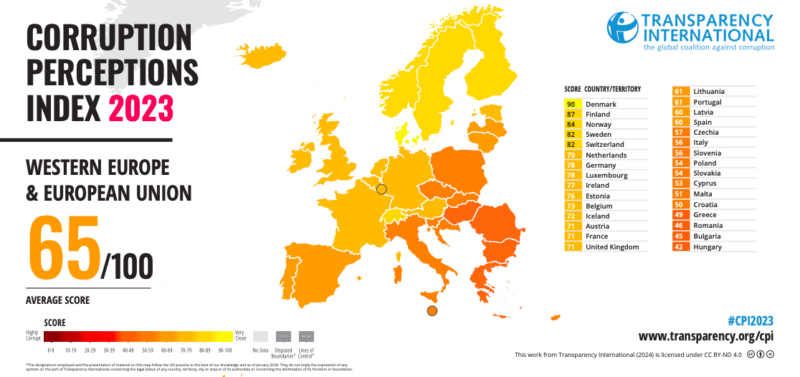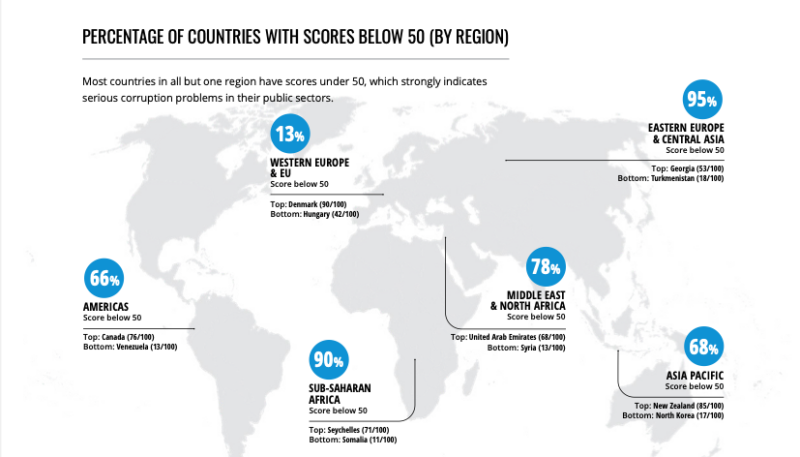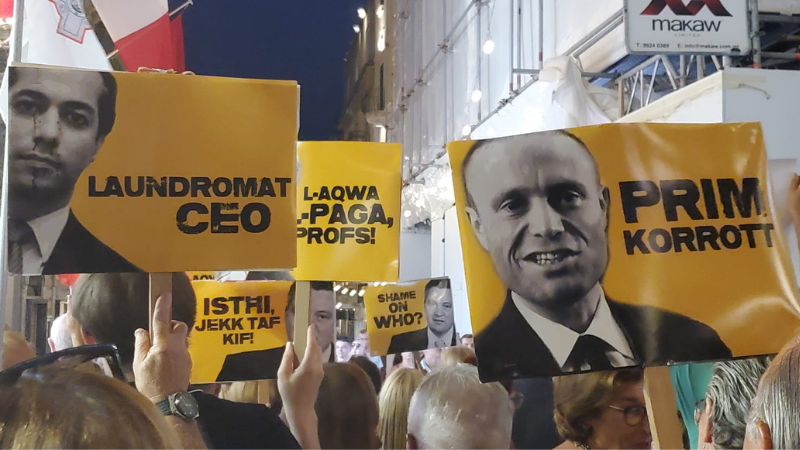Malta’s standing on Transparency International’s 2023 Corruption Perceptions Index (CPI) remained unchanged from the previous year, maintaining its dismal score of 51 out of 100, the lowest ever recorded.
This continued stagnation reflects Malta’s downward trend that has persisted since 2015, with the score dropping by nine points and showing no improvement.
The 2023 Corruption Perceptions Index (CPI) released on Tuesday shows that most countries have made little progress tackling public sector corruption.
The index ranks 180 countries and territories by their perceived levels of public sector corruption according to 13 expert assessments. On the scale, 100 is very clean, and 0 is highly corrupt.
Malta’s score and a decrease in the European average
The CPI report for 2023 highlights a concerning development: for the first time in a decade, the average score in Western Europe and the European Union (EU) has slipped to 65 out of 100.
Furthermore, the report reveals that anti-corruption efforts have either stalled or regressed in more than three-quarters of the countries in the region.
Among the 31 European countries evaluated, only six have managed to enhance their scores since 2012, while eight have experienced a decline.
In the European regional context, Malta ranked sixth lowest in 2023 with a score of 51, followed by Croatia (50), Greece (49), Romania (46), Bulgaria (45), and Hungary (42).
A troubling trend noted in the report is the growing difficulty faced by journalists in reporting on corruption, not only in Malta but also in countries like Cyprus (53), Ireland (77), Hungary (42), Croatia (50), Bulgaria (45), the Netherlands (79), and Poland (54).
This challenge stems from the heightened use of strategic lawsuits against public participation (SLAPPs) and legal intimidation by influential businesses and politicians.
Malta has had the most SLAPPs per capita for two consecutive years due to the government’s legal challenges against 40 Freedom of Information requests filed by The Shift.

Map of the regional scores in Western Europe and the European Union. Source: Transparency International
Moreover, the report underscores the European Parliament’s recent resolution urging Maltese authorities to intensify investigations into potential cases of former public officials obstructing justice and concealing evidence related to the murder of investigative journalist Daphne Caruana Galizia.
In addition to challenges in reporting corruption, the report describes how weaknesses in judicial systems across various countries pose significant barriers to accessing justice and curbing government overreach.
Transparency International’s report states that the EU has raised concerns about the appointment procedures for judges and the overall quality of the justice system in several countries, including Malta (51), Sweden (82), Spain (60), Poland (54), Croatia (50), Greece (49), Lithuania (61), and Ireland (77). These issues underscore the pressing need for systemic reforms to address corruption and strengthen the rule of law across the region.
The relationship between dysfunctional justice systems and corruption
The CPI global average remains unchanged at 43 for the twelfth year in a row, with more than two-thirds of countries scoring below 50, indicating severe corruption problems.
For the sixth year in a row, Denmark tops the global ranking with a score of 90. It is followed closely by Finland and New Zealand, with scores of 87 and 85, respectively. Norway (84), Singapore (83), Sweden (82), Switzerland (82), the Netherlands (79), Germany (78) and Luxembourg (78) are the countries in the top 10 this year.
Conversely, countries grappling with conflict or severely restricted freedoms and weak democratic institutions tend to fare poorly. This year, Somalia (11), Venezuela (13), Syria (13) and South Sudan (13) are at the bottom of the index. Moreover, the top 25 countries in the index make up just over 10 per cent of the world’s people. Over 80 per cent of the world’s population lives in countries with CPI scores below the global average of 43.

Percentage of countries with CPI scores below 50. Source Transparency International
This year’s CPI report focuses on the relationship between well-functioning justice systems and the fight against corruption. The report notes that when the justice system is weak, dysfunctional, or lacks independence, it cannot uphold the law and ensure it is applied equally to all. As the report aptly points out, CPI scores also plummet in countries where public officials and private entities face minimal consequences for misconduct.
François Valérian, Chair of Transparency International, said, “Corruption will continue to thrive until justice systems can punish wrongdoing and keep governments in check. When justice is bought or politically interfered with, the people suffer. Leaders should fully invest in and guarantee the independence of institutions that uphold the law and tackle corruption. It is time to end impunity for corruption.”
The full report and related data for Transparency International’s Corruption Perception Index can be found here.














Frankly I’m amazed that we are at that level, I would have guessed we would be level with Venezuela or Somalia or possibly lower.
The trough from which the friends of friends gorge themselves seems to be growing ever bigger, which perhaps explains why the score remains the same ?
Logic dictates that with the ever increasing number of allegations of corruption involving leading political figures exposed by the Shift on an almost daily basis, the score should be plummeting.
As Mark Twain so famously stated “ There are lies, damned lies and statistics “.
What do you expect when Malta has a weak prime minister who consistently overlooks cases of abuse of power and high-level corruption scandals involving persons close to him?
More recently Robert Abela demonstrated his lack of integrity by allowing former parliamentary secretary Rosianne Cutajar back in the Labour Party, despite her serious breach of ethical conduct when she failed to disclose her conflict of interest in a speech she delivered to the Parliamentary Assembly of the Council of Europe, and her pigging out from the public coffers for a ghost job at the Institute of Tourism Studies. Abela went against his pledge that he would not allow Cutajar to contest as a Labour election candidate, and even accepted former minister Justyn Caruana as a contestant for elections on behalf of the party despite similarly breaching ethical conduct and adopting a pig-sty behaviour by gifting her boyfriend a lucrative contract forked out by the taxpayer for a job beyond his capabilities. Abela went on to demonstrate his weakness by bowing down to the candidacy of his disgraced predecessor Joseph Muscat for the European Parliament elections.